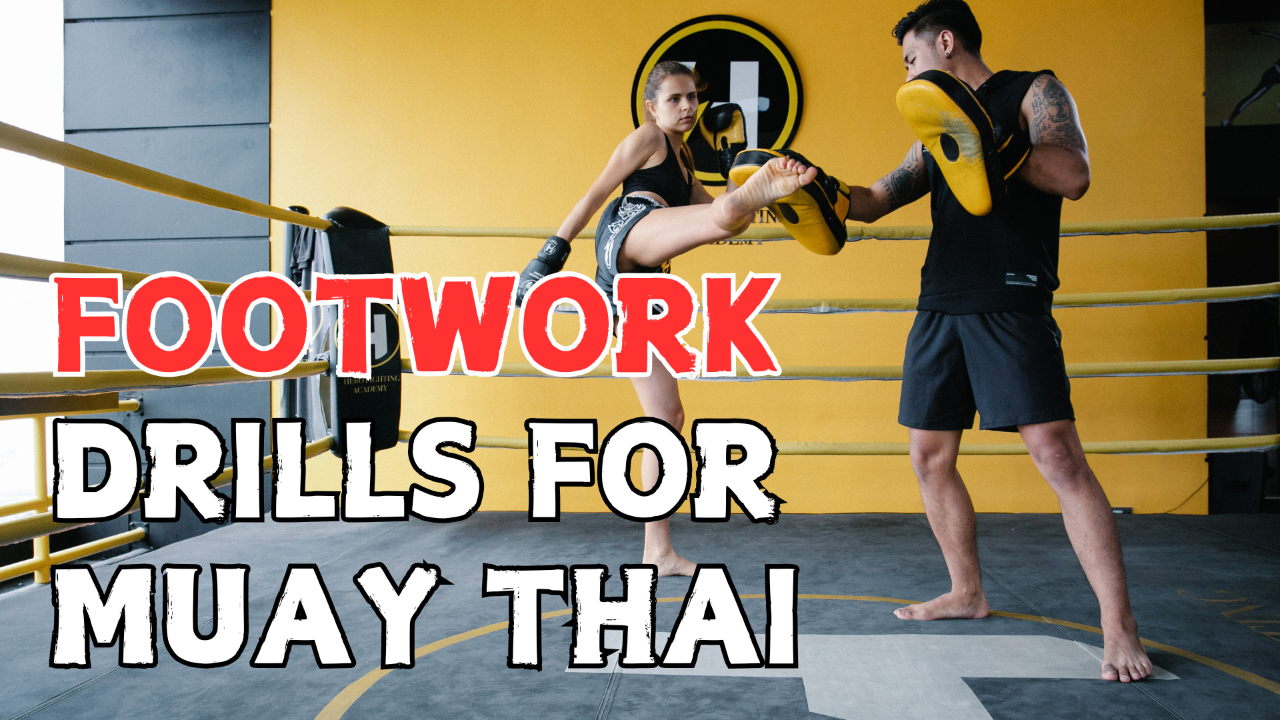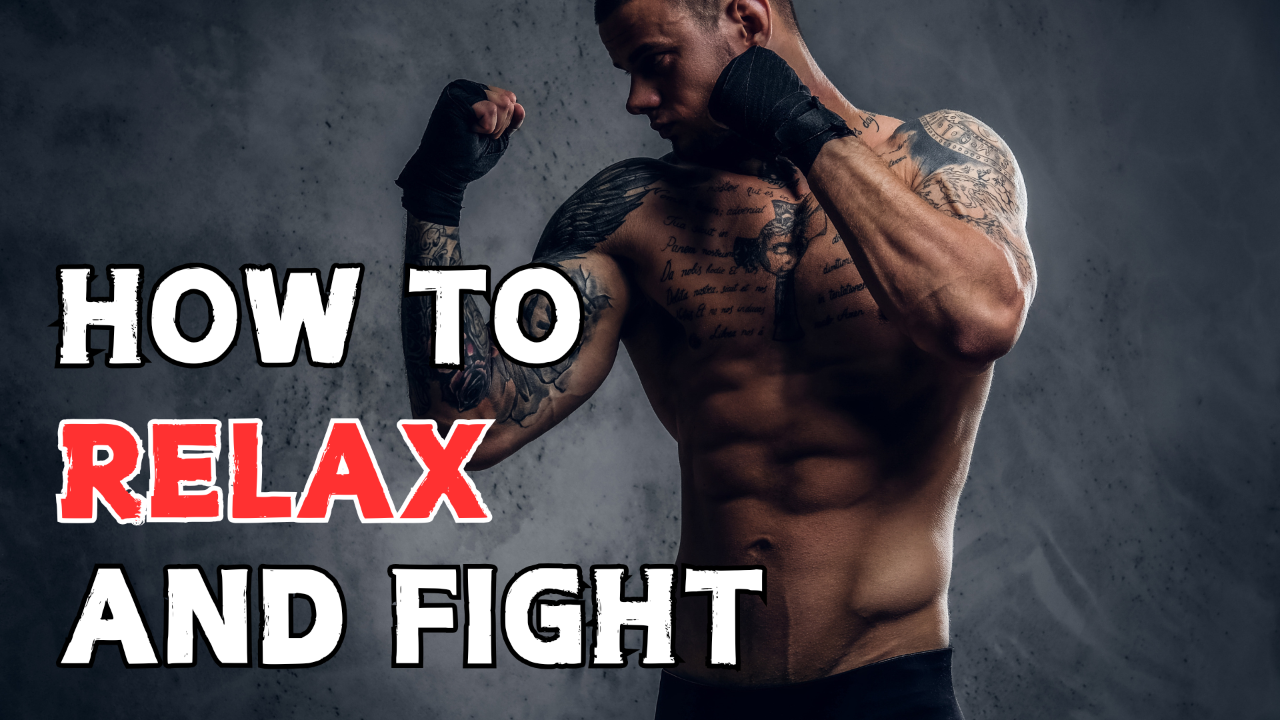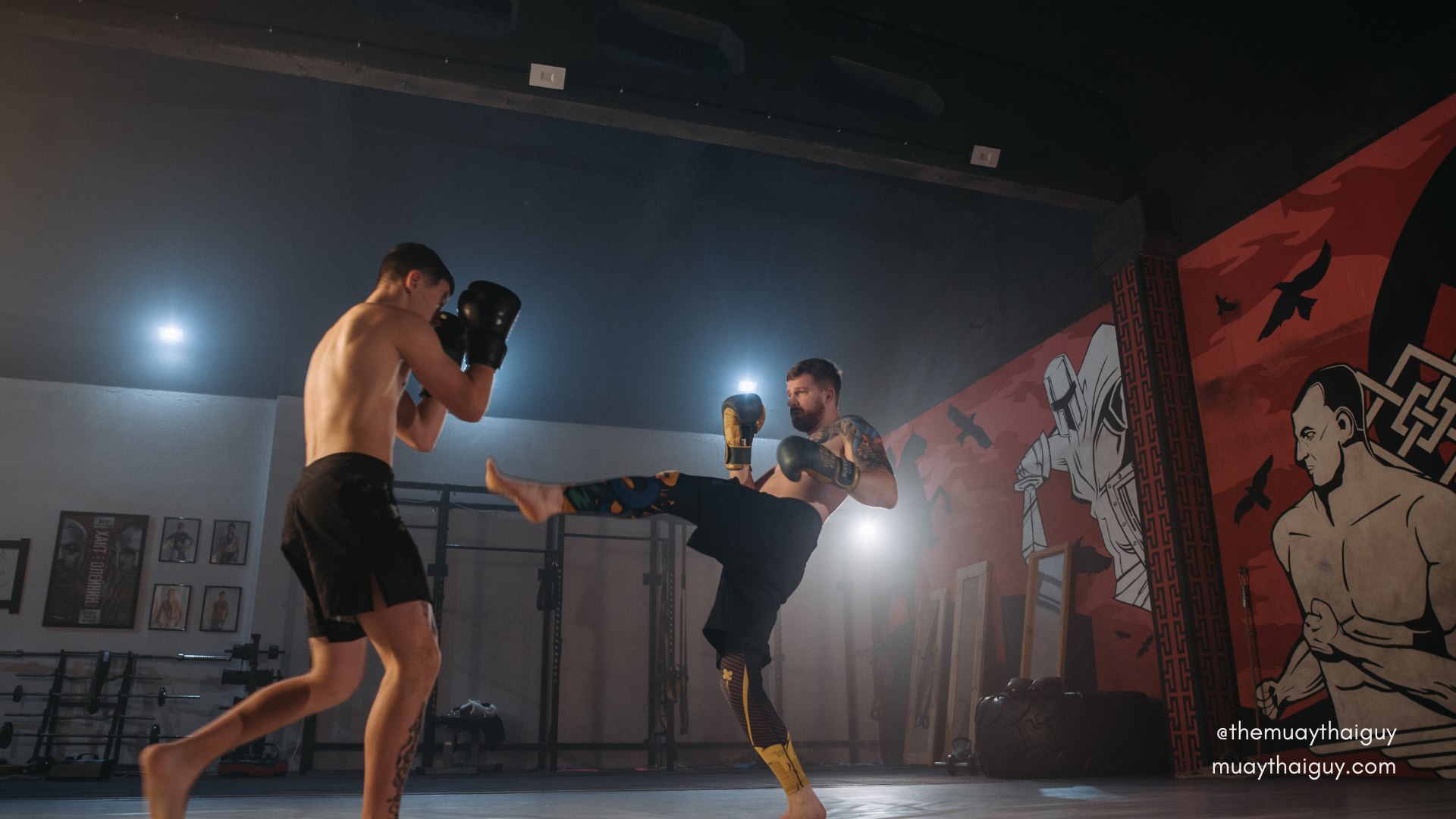The Secret Weapon You Need: Muay Thai Footwork

PRACTICAL DRILLS FOR IMPROVING FOOTWORK
In Muay Thai, footwork is just as important as your strikes and defenses. In fact, a well-timed step or shift can set you up for a knockout blow or help you avoid taking one.
The key is being light on your feet and always ready to move—whether it’s advancing, retreating, or sidestepping. As much as Muay Thai is about power and precision, it’s also about positioning.
The first thing you need to focus on is staying light on your feet.
Too many fighters fall into the trap of becoming flat-footed or sluggish, which makes them slower to react. Imagine the difference between a fighter who glides across the ring and one who’s rooted to the canvas. It’s the first fighter who controls the pace and positioning.
I’ve found that when I worked on staying light and mobile, my reactions got faster, and I had a much easier time landing shots or escaping dangerous situations.

Mastering angles and distance is another major component of Muay Thai footwork. ...
Relaxation Techniques for Better Performance in Sparring

THE FOUNDATION OF CALMNESS UNDER FIRE
Sparring in Muay Thai can be intense, especially when the pressure is on.
One of the biggest challenges is staying relaxed and not letting the heat of the moment tighten you up. But relaxation isn’t just about staying calm—it’s about being able to flow, react efficiently, and keep your energy for the long haul.
Through the years of sparring and competing at a high level, I’ve learned that a relaxed fighter is a dangerous one. Here’s how you can make it work for you.

Breath control is the first thing you’ll want to master.
When you’re in the ring, the natural inclination is to breathe shallowly, especially if you’re feeling tense or trying to overpower your opponent. Instead, focus on steady, deep breaths, especially with every strike and movement.
This not only keeps your mind calm, but it also helps maintain your energy level for longer. For example, every time I threw a kick, I made sure to exhale with it, which allowed me to throw harder...
10 Tips to Transition From Amateur to Pro Muay Thai Fighter

HOW TO LEVEL UP AND MAKE IT TO THE NEXT STAGE OF YOUR FIGHTING CAREER
Making the leap from amateur to professional Muay Thai is one of the most rewarding—and challenging—steps in a fighter’s journey. It’s not just about improving your skills in the ring; it’s about transforming your mindset, training habits, and lifestyle to match the demands of professional competition.
I’ve been there myself, going from local fights to competing in Thailand against seasoned fighters, and I can tell you: it’s a grind, but it’s worth it. Here’s how to do it the right way.
1. Sharpen Your Technique for Professional Standards
At the amateur level, raw power and aggression might get you by, but professionals know how to capitalize on every mistake. This means cleaning up your technique.
Spend extra time drilling fundamentals—perfect your kicks, elbows, and defensive maneuvers. Film your training and sparring sessions to identify weaknesses and work on them relentlessly. Professionals leave no gaps fo...
How to Train Your Mind Like a Champion Fighter

TURNING FEAR AND NERVES INTO CONFIDENCE
If you’ve ever stepped into the ring or been in a fierce sparring session, you know that Muay Thai isn’t just a test of physical strength—it’s a test of mental toughness.
Fighting isn’t just about the punches you throw or the kicks you land. It’s about staying calm when everything feels chaotic, pushing through the pain, and keeping your focus when it feels like everything is falling apart.
Having spent countless hours training in Thailand, facing top-tier competition, I can tell you firsthand: the toughest fighters aren’t always the ones who are the most technically skilled. They’re the ones who can keep their head in the game, no matter what.
-
The Importance of Mental Resilience in Muay Thai
In Muay Thai, mental toughness is about handling adversity with a clear mind. It’s about staying focused even when you’re getting hit hard, feeling exhausted, or finding yourself in a bad position during a clinch.
Resilience allows you to reco...
5 Core Strength Drills Every Muay Thai Fighter Should Master

WHY A STRONG CORE IS ESSENTIAL FOR MUAY THAI PERFORMANCE
When people think about core strength, they often picture six-pack abs.
But for Muay Thai fighters, a strong core goes far beyond aesthetics. It’s the powerhouse behind every strike, the shield that absorbs kicks and knees, and the foundation of balance and stability.
During my fighting career, I quickly learned that training my core wasn’t optional—it was essential for staying competitive in the ring. Let’s dive into five of the best core strength exercises and how they can enhance your performance.
WHY A STRONG CORE IS ESSENTIAL FOR MUAY THAI PERFORMANCE
Your core is the link between your upper and lower body. Whether you’re throwing a punch, delivering a knee, or evading an opponent’s strike, every movement starts and ends with your core. A weak core limits your ability to generate power and leaves you vulnerable to attacks.
In Muay Thai, the core is especially important because of the sport’s unique demands—twisting kic...
How to Improve Your Muay Thai Defense

DEFENSIVE DRILLS TO BOOST YOUR SKILLS
When I first started competing, one of the biggest lessons I learned was that good defense wins fights.
In Muay Thai, it’s not just about throwing punches or kicks but knowing how to avoid taking damage in the first place. I’ve fought some of the best in Thailand, and what separated the elite fighters from the rest wasn’t just their offensive skills, but their defensive mastery.
Let’s dig into the key components of defensive techniques and drills that can make you harder to hit—and more dangerous to your opponents.
Mastering the Guard
A solid guard is the foundation of your defense. The Muay Thai guard is about more than just covering your face—it’s about positioning your body to react to incoming strikes. Keep your hands high, with your elbows tucked in to protect your ribs. Your stance should be balanced so you can move quickly if you need to avoid a strike.
Key Tips:
- Keep your hands up and close to your head; this prevents you from bein ...
How S&C Can Transform Your Muay Thai Game

THE CONNECTION BETWEEN MOBILITY AND PERFORMANCE
When it comes to Muay Thai, fighters typically think of striking, clinching, and movement. But there’s a crucial aspect that often gets overlooked—strength and conditioning (S&C).
The truth is, having the right physical conditioning can be the difference between winning and losing. From my experience as a pro fighter, I can say that S&C wasn’t just important; it was essential for my success, especially during my fight camps in Thailand.
Muay Thai Demands High-Intensity, Explosive Power
Muay Thai isn’t just about endurance—though that’s definitely a big part of it. A lot of the movements are explosive in nature, requiring short bursts of power. When you throw a knee, elbow, or kick, or even engage in a clinch, your body needs to generate force quickly.
Why It Matters:
- Power Output: S&C helps build explosive strength, which is crucial for generating the force behind your strikes and actions.
- Muscle Endurance: Conditioning helps sus ...
The Art of Blocking, Parrying, and Evading

MASTERING THE ART OF STAYING ELUSIVE IN MUAY THAI
In Muay Thai, defense is just as critical as offense.
A solid defense not only protects you from damage but also sets up counterattacks, disrupts your opponent's rhythm, and conserves your energy for the later rounds. Let’s dive into the core defensive techniques of Muay Thai and how to master them.
Blocking: The First Line of Defense
Blocking involves using your arms, legs, and body to absorb or deflect strikes. Key techniques include:
- Leg Checks: When blocking low kicks, raise your shin at a slight outward angle to meet your opponent’s kick. The goal is to intercept the strike on the harder part of your shin rather than taking it on the softer tissue of your thigh. Timing is everything; lifting your leg too early allows the opponent to feint, while lifting it too late means you’ll eat the kick.
- High Guard: Keep your gloves glued to your temples to absorb punches and elbows. Your elbows should stay tucked close to your body to ...
7 Ways to Increase Your Kicking Power in Muay Thai

COMMON MISTAKES THAT REDUCE KICKING POWER
In Muay Thai, a powerful kick can be a fight-ending weapon.
Although I'm mostly a boxer, I learned about the power of kicks early in my career, especially in Thailand, where sharp, devastating kicks are celebrated as the hallmark of elite fighters. But achieving that level of power takes more than brute strength; it’s a combination of technique, timing, conditioning, and precision.
Let’s dive into the key strategies to take your kicks to the next level.
Perfect Your Technique
At its core, a strong kick is all about proper mechanics. The roundhouse kick, for example, should feel like a whip, with your entire body working in unison to generate force.
Start by pivoting your supporting foot, which allows your hips to rotate fully. Without this pivot, your kick loses power and leaves you off balance. Your shin should be the main striking surface, making clean and solid contact. As your leg swings through, engage your core and shoulders for max...
5 Essential Muay Thai Footwork Drills for Beginners and Advanced Fighters

THE ESSENTIALS OF PERFECT MUAY THAI FOOTWORK
During my time in Thailand, I quickly learned that fights are often won or lost based on footwork. Facing skilled Thai opponents, I saw firsthand how precise movement can create openings or completely shut down attacks.
The fighters who dominated the ring didn’t always hit the hardest—they moved the smartest. Whether you’re starting out or looking to refine your skills, these drills will help you take your footwork to the next level.
Shadowboxing with Footwork Focus
Shadowboxing isn’t just about throwing strikes; it’s the perfect time to refine your footwork. Move around the imaginary opponent, maintaining a balanced stance and light feet. Focus on lateral movement, pivots, and quick direction changes.
Key: Keep your weight evenly distributed to avoid being off-balance, and practice moving both forward and backward fluidly.
Ladder Drills for Speed and Agility
Using an agility ladder is one of the best ways to enhance coordination and ...





